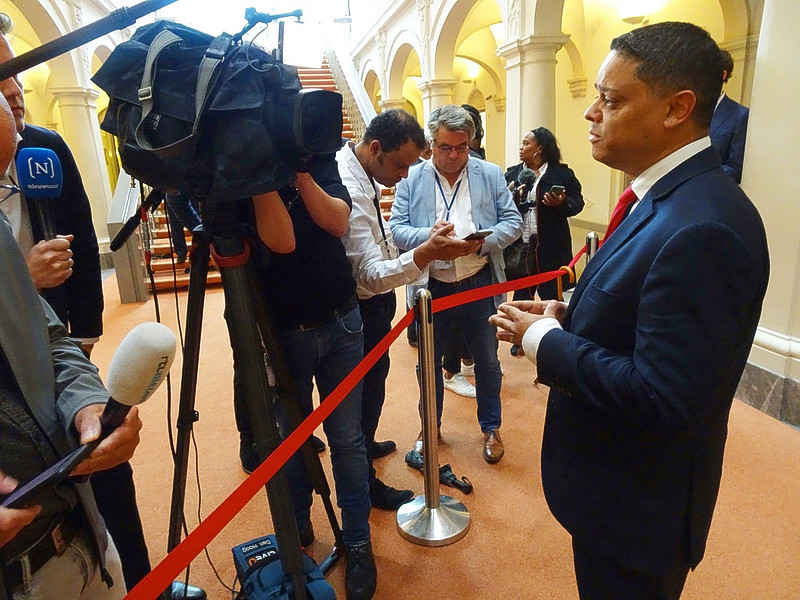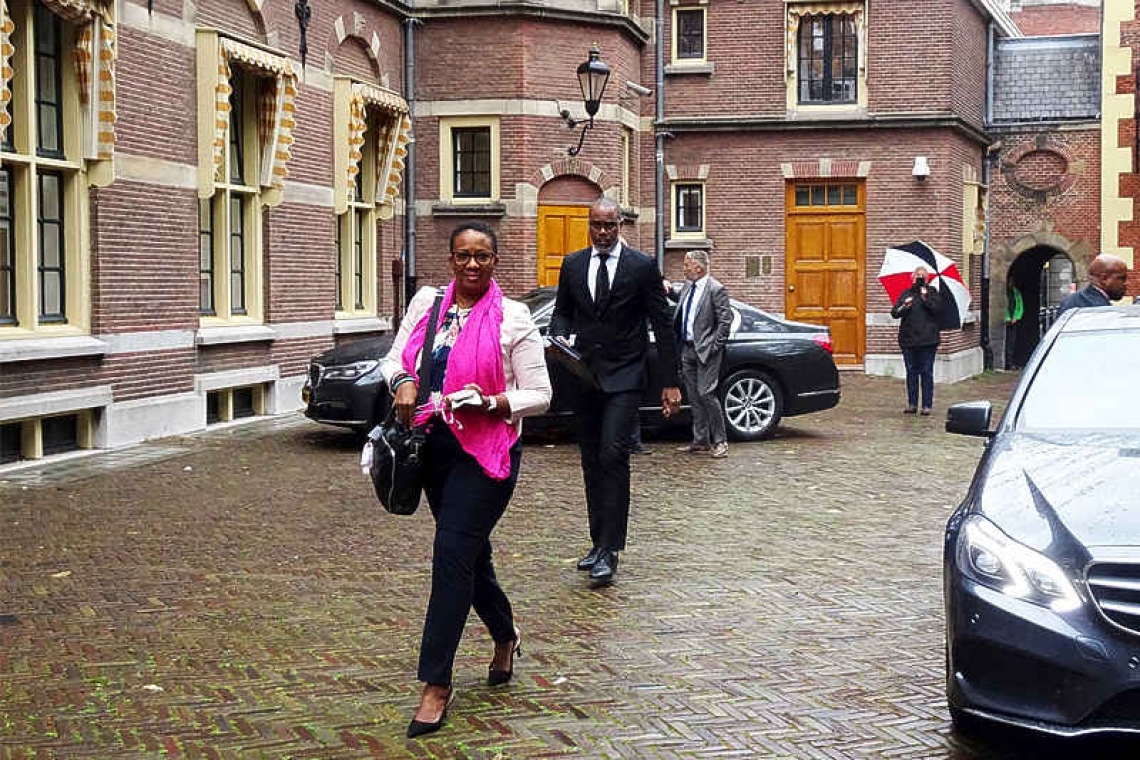St. Maarten Prime Minister Silveria Jacobs as she arrives at the Binnenhof on Friday morning for a meeting of the Kingdom Council of Ministers. Directly behind her is St. Maarten Minister Plenipotentiary Rene Violenus. (Suzanne Koelega photo)
~New deadline set for July 15~
THE HAGUE--As expected, no agreement was reached during the meeting of the Kingdom Council of Ministers today, Friday regarding the new entity to channel future liquidity support and to implement reforms.
And while St. Maarten and Curaçao received a new deadline of July 15 to comply with the conditions of the second tranche liquidity support so they can qualify for funding of the third tranche, Aruba did comply with those conditions and will receive funds of the third tranche, some 204 million Aruba florins, to cover July, August and September.
Curaçao and St. Maarten will have to wait a bit longer on that funding, because they still have some homework to do. “We have until July 15 to finalise the criteria regarding the salary support programme. We would have to change over the system. If we have to, we will,” said St. Maarten Prime Minister Silveria Jacobs after the meeting.
As for the third tranche, discussions will have to continue with the Netherlands. “I’m happy that it has not been forced through despite the fact that we as three countries could not agree to the conditions,” said Jacobs.
Jacobs and Curaçao Prime Minister Eugene Rhuggenaath said they needed more time reach an agreement with the labour unions concerning the 12.5 per cent salary cut that The Hague has demanded for the total wage sum of the Curaçao and St. Maarten governments.
“We are not against reforms. We were already executing reforms. The problem is the high speed in which the Netherlands forces us to get it done. We have to talk with the unions in a local context whereby unemployment has increased to 50 per cent. We have the space to continue talks on a total package that we are part of and that we can justify,” said Rhuggenaath.
Curaçao Prime Minister Eugene Rhuggenaath being interviewed. A lot of media came out to cover the Kingdom Council of Ministers meeting. (Suzanne Koelega photo)

The three prime ministers of Aruba, Curaçao and St. Maarten came in person to The Hague to formally object to give approval up front to the Dutch proposal to establish a new entity via a Kingdom consensus law.
“There is no deal on this. A consensus Kingdom law should have consensus before it reaches this point and that was not the case. As Dutch Caribbean countries we stood our grounds,” said Jacobs, who noted that the meeting was held in an amicable atmosphere. “What has been lacking is the understanding of what such a law would mean for us whereby the hands of government and parliament would be bound.”
“We couldn’t agree on a consensus law without the necessary consensus. I’m glad that the other two prime ministers were here to have this talk face-to-face with the Netherlands,” said Rhuggenaath. “There was no consensus on the Kingdom consensus law. That matter has been shelved for now and we will continue working towards a consensus,” said Aruba Prime Minister Evelyn Wever-Croes.
Aruba Prime Minister Evelyn Wever-Croes addresses the media after the Kingdom Council of Ministers meeting with Dutch State Secretary Raymond Knops standing directly behind her. (Suzanne Koelega photo)
Wever-Croes explained that Aruba also didn’t approve the new conditions “as is,” including the Caribbean Reform Entity, but that talks with the Netherlands will continue in the coming days in order to hopefully have an agreement by the end of next week. “The Netherlands wants to assist us with making Aruba more resilient and that sounds positive. We direly need the support for the coming period,” she said.
State Secretary of Home Affairs and Kingdom Relations Raymond Knops said he was “optimistic” that an agreement would still be reached with the three countries. The Dutch government has reserved 500 million euro to make investments in the three countries for the next 5 to 7 years.
“We have made a reasonable offer. We are making a lot of money available in the coming years, amounting up to 1 billion euro. We have to make sure that this money is spent well, that is our responsibility, because it concerns Dutch taxpayers’ money,” said knops.
The Caribbean Reform Entity would be established to guarantee that the “hundreds of millions” are spent in the correct manner, said the state secretary. “We are doing this to make the countries more resilient. We do this in the interest of the people there. Not because we want to take control or to take over the autonomy.”
The entity would consist of three experts, to be selected by the Netherlands. Knops said that “naturally” these would be persons with affinity to the islands. The Kingdom consensus law to establish this entity would run its usual course with the input of the parliaments. He said that Friday’s Kingdom Council of Ministers meeting was to seek political approval to forward the package to the parliaments. “Two countries said that at this time, they could not agree with this. We will continue the consultations with the countries.”







